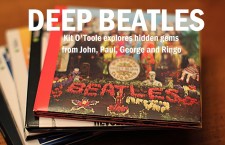The year was 1985; the scene, Mr. Tantillo’s eighth-grade chorus class. On Fridays, students were allowed to bring in their own music so we could “experience” diverse tastes. (As I look back, I think Mr. Tantillo just needed a break from teaching a bunch of hormone-riddled preteens five days a week.) Fully immersed in popular artists of the day — Duran Duran, Wham!, and Whitney Houston — I barely paid attention when a fellow student stuck a cassette into the classroom’s tape deck. Suddenly guitars faded in, and verse one began:
Ooh I need your love, babe
Guess you know it’s true
Hope you need my love, babe
Just like I need you
By the time the hand-clapping powered chorus rang out, I looked up from doodling in my spiral notebook. Who was this? I’d never heard anything that catchy before, and it sounded completely different from anything on the radio. I wandered over to the stereo, where a cassette box had been carelessly tossed aside. Picking up the plastic case, I read the title: 20 Greatest Hits by The Beatles. Oh yeah, I had heard of them — my father, who plays several instruments, often played some of their songs on his guitar. A former babysitter used to moon over Paul McCartney, but being just a kid, I had tuned her out. Well, I thought, I guess I should give them another listen. After school, I convinced my mother to drive me to Rose Records (a Chicago-based record store chain), and I purchased the 20 Greatest Hits collection. Since that day, I’ve never looked back.
As I purchased more and more albums, I also read as much as I could about the band and watched the Compleat Beatles documentary on VHS tape repeatedly. When I had finished buying the whole Beatles catalog — the American releases, of course — I moved on to solo albums. By the early 1990s, I subscribed to Beatlefan magazine, and soon applied for a brand-new position: internet columnist. To use a bad Beatles pun — yes, I passed the audition. Today, I still write that column, “Hard Day’s Net,” which covers various Beatles and solo sites on the web.
Then in 2000, I made the ultimate rock pilgrimage: I visited Liverpool, where I stood before the Strawberry Field gates, drove down Penny Lane, and gazed at the Fab Four’s childhood homes. In London, I stared in wonder at the former Apple headquarters, pondering what it would have been like to witness their final rooftop performance. I’ve attended the Chicago Fest for Beatles Fans every year since the early 1990s, and have had the honor of meeting players in Beatles history: Klaus Voormann, Gerry Marsden of Gerry and the Pacemakers, the late Billy Preston, and original Beatles drummer Pete Best. What began as a mild interest turned into a hobby and passion that has greatly enriched my life.
Therefore, I am excited to begin this new column for Something Else!, “Deep Beatles.” Each column will spotlight songs from the Beatles and solo years’ catalogs that radio may not play on a regular basis, but are hidden gems. I look forward to exploring their songs with you, and focusing on tracks that deserve more attention. Your comments and thoughts are welcome, too, as engaging in dialogue about their music is one of the many pleasures of being a Beatles fan.
While not necessarily a “deep track,” I’ll kick off this column with “Eight Days A Week,” the song that hooked me 27 years ago. A song fading out at the end was common, but here the guitars gradually fade in at the beginning, which instantly demands the listener’s ear. As evidenced on the Anthology collection, the Beatles experimented with earlier versions of the song, including adding an “ooo” vocal in lieu of the fade in. But the group wisely chose the experimental introduction. As for the typically humorous title (reminiscent of “A Hard Day’s Night”), McCartney has offered two explanations for the unusual wording. In 1984 he claimed it stemmed from a Ringo Starr malapropism; in another interview he recalled it being a statement from his then-chauffeur.
Interestingly, John Lennon thought “Eight Days A Week” was one of their weaker tunes; in 1972, Lennon stated that “we struggled to record it and struggled to make it into a song. It was his (Paul’s) initial effort, but I think we both worked on it. I’m not sure. But it was lousy anyway.” Regardless of Lennon’s subsequent opinion, “Eight Days A Week” stands as a stellar illustration of their pop sensibilities, a textbook example of writing a memorable song with lyrics and chord changes that linger with the listener long after the record ends.
- How John Lennon Came Roaring Back on the Beatles’ White Album - November 22, 2023
- Five ‘With the Beatles’ Deep Cuts That Illustrate Their Lasting Debt to R&B - November 20, 2023
- Five Must-Hear Deep Cuts from the Beatles’ ‘Past Masters’ - March 7, 2023


